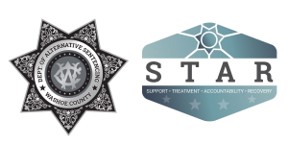Star Program

What is the STAR Program?
The STAR program is a new initiative funded by a grant through the Nevada Division of Public and Behavioral Health that has been introduced into the Department of Alternative Sentencing to provide wrap-around, community-based treatment services and community supervision for individuals struggling with an Opioid Use Disorder (OUD).
The STAR program is designed to achieve meaningful change in thoughts, feelings, and behaviors related to criminal activity and addiction, and promote the skills necessary for a sustained lifestyle of recovery.
The program consists of a probation officer, peer support specialist, case manager and a clinician to help the process of recovery.
Qualifications
- Addicted to Opiates/Diagnosed OUD
- No history of violent crimes
- No Sex Offences
Phases of the STAR Program
Support Phase:
- Stabilization Phase, addressing initial barriers to success, such as housing, transportation, evaluation, detox, etc. Also dedicated to enrollment in services, such as MAT and IOP.
Treatment Phase:
- Participants should be actively engaging in treatment, conditions of supervision, and classroom based curricula via the Courage to Change Interactive Journaling series. Participants should be demonstrating commitment to the program as a whole, with recognizable buy-in to the program.
Accountability Phase:
- Application period for the skills learned through programming. Participants should be able to not only internalize the information received, but begin applying new skills and behaviors.
Recovery Phase:
- Completion of classroom instruction, engaged in active, sustained recovery and aftercare planning. Participants will have increased contact with the STAR Team during the recovery phase to ensure a clean departure from the program as some of the more structured, classroom driven aspects begin falling away
Program Duration
Four phases of intensive supervision programming over approximately 12 months, plus aftercare.
Duration of each phase of programming is based on individual program progression, not a specified timeline. Participants are expected to be an active member of their unique program experience while reflecting on challenges and successes, celebrating the progress made, and anticipating what the future may hold along the way.
MAT Programming
STAR is designed to include Medication Assisted Treatment (MAT) as a key component of participant recovery. MAT allows participants to focus on treatment without the burden and distraction of withdrawal symptoms and substance cravings. STAR participants have access to streamlined services for MAT, residential treatment and sober living admission, as well as counseling and other support services though established community partnerships.
